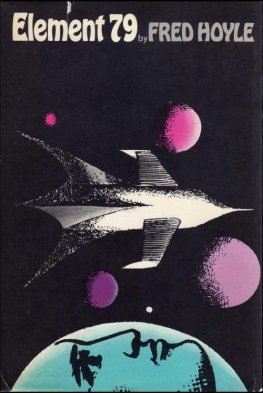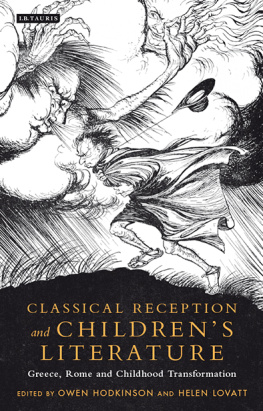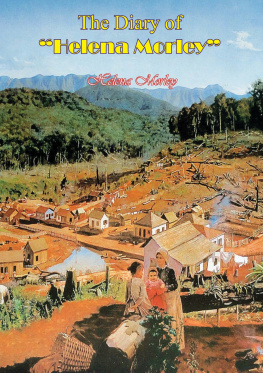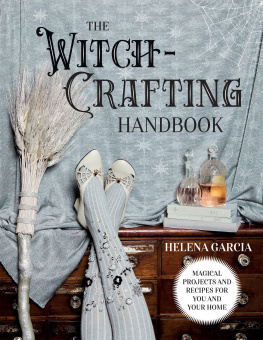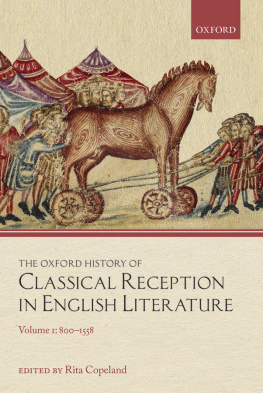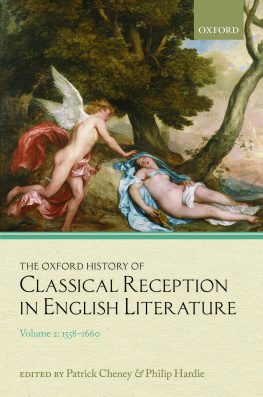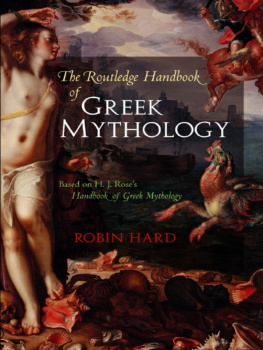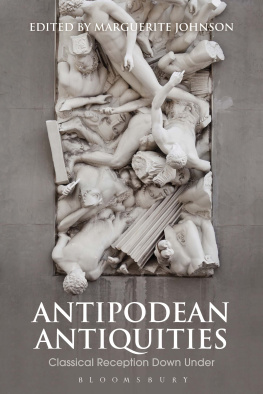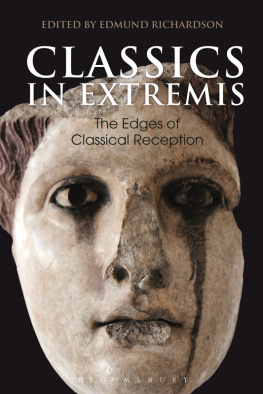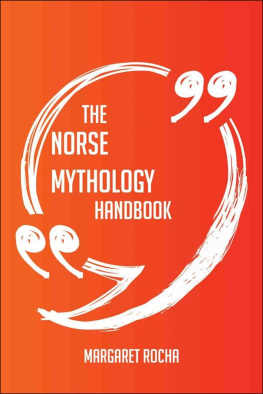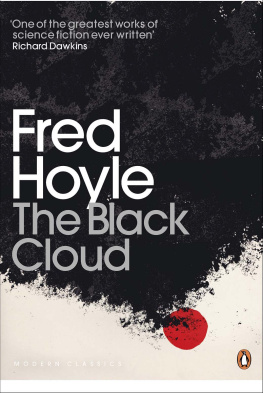Hoyle Helena - A Handbook to the Reception of Classical Mythology
Here you can read online Hoyle Helena - A Handbook to the Reception of Classical Mythology full text of the book (entire story) in english for free. Download pdf and epub, get meaning, cover and reviews about this ebook. City: Hoboken;N.J, year: 2017, publisher: John Wiley & Sons, Incorporated;Wiley Blackwell, genre: Art. Description of the work, (preface) as well as reviews are available. Best literature library LitArk.com created for fans of good reading and offers a wide selection of genres:
Romance novel
Science fiction
Adventure
Detective
Science
History
Home and family
Prose
Art
Politics
Computer
Non-fiction
Religion
Business
Children
Humor
Choose a favorite category and find really read worthwhile books. Enjoy immersion in the world of imagination, feel the emotions of the characters or learn something new for yourself, make an fascinating discovery.

- Book:A Handbook to the Reception of Classical Mythology
- Author:
- Publisher:John Wiley & Sons, Incorporated;Wiley Blackwell
- Genre:
- Year:2017
- City:Hoboken;N.J
- Rating:4 / 5
- Favourites:Add to favourites
- Your mark:
- 80
- 1
- 2
- 3
- 4
- 5
A Handbook to the Reception of Classical Mythology: summary, description and annotation
We offer to read an annotation, description, summary or preface (depends on what the author of the book "A Handbook to the Reception of Classical Mythology" wrote himself). If you haven't found the necessary information about the book — write in the comments, we will try to find it.
A Handbook to the Reception of Classical Mythology — read online for free the complete book (whole text) full work
Below is the text of the book, divided by pages. System saving the place of the last page read, allows you to conveniently read the book "A Handbook to the Reception of Classical Mythology" online for free, without having to search again every time where you left off. Put a bookmark, and you can go to the page where you finished reading at any time.
Font size:
Interval:
Bookmark:
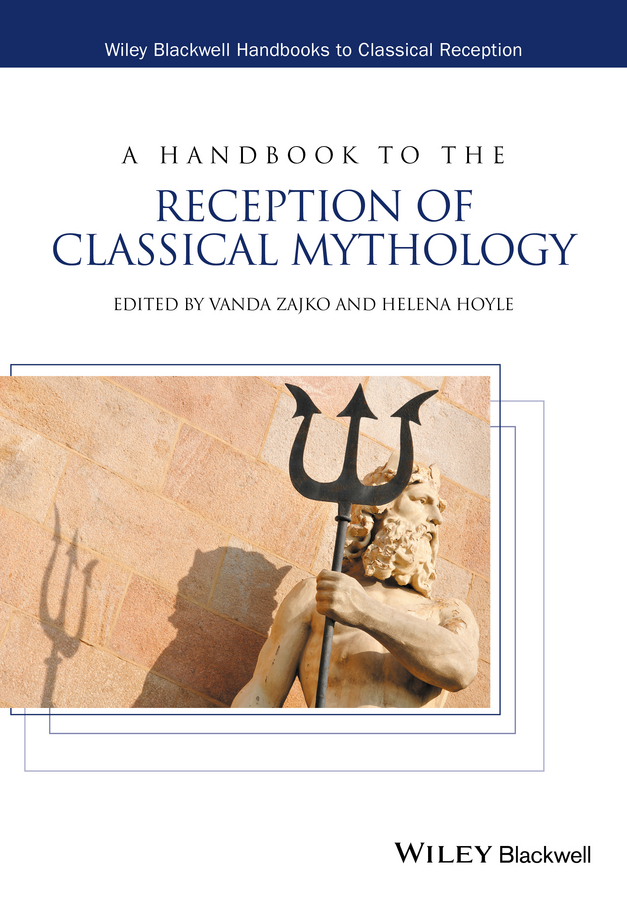
- Chapter 04
- Chapter 06
- Chapter 20
- Chapter 26
- Chapter 31
This series offers comprehensive, thoughtprovoking surveys of the reception of major classical authors and themes. These Handbooks will consist of approximately 30 newly written essays by leading scholars in the field, and will map the ways in which the ancient world has been viewed and adapted up to the present day. Essays are meant to be engaging, accessible, and scholarly pieces of writing, and are designed for an audience of advanced undergraduates, graduates, and scholars.
Published :
A Handbook to the Reception of Ovid
John Miller and Carole E. Newlands
A Handbook to the Reception of Thucydides
Christine Lee and Neville Morley
A Handbook to the Reception of Greek Drama
Betine van Zyl Smit
Forthcoming :
A Handbook to the Reception of Classical Mythology
Vanda Zajko and Helena Hoyle
A Handbook to Classical Reception in Eastern and Central Europe
Zara Martirosova Torlone, Dana LaCourse Munteanu, and Dorota Dutsch
Edited by
Vanda Zajko and Helena Hoyle

This edition first published 2017
2017 John Wiley & Sons, Inc.
All rights reserved. No part of this publication may be reproduced, stored in a retrieval system, or transmitted, in any form or by any means, electronic, mechanical, photocopying, recording or otherwise, except as permitted by law. Advice on how to obtain permision to reuse material from this title is available at http://www.wiley.com/go/permissions.
The right of Vanda Zajko and Helena Hoyle to be identified as the authors of the editorial material in this work has been asserted in accordance with law.
Registered Office
John Wiley & Sons, Inc., 111 River Street, Hoboken, NJ 07030, USA
Editorial Office
350 Main Street, Malden MA 021485020, USA
For details of our global editorial offices, customer services, and more information about Wiley products visit us at www.wiley.com.
Wiley also publishes its books in a variety of electronic formats and by printondemand. Some content that appears in standard print versions of this book may not be available in other formats.
Limit of Liability/Disclaimer of Warranty
While the publisher and authors have used their best efforts in preparing this book, they make no representations or warranties with respect to the accuracy or completeness of the contents of this book and specifically disclaim any implied warranties of merchantability or fitness for a particular purpose. It is sold on the understanding that the publisher is not engaged in rendering professional services and neither the publisher nor the authors shall be liable for damages arising herefrom. If professional advice or other expert assistance is required, the services of a competent professional should be sought.
Library of Congress CataloginginPublication data applied for
9781444339604 (hardback)
Cover image: lamiel/Gettyimages
Cover design by Wiley
Rosemary Barrow is a Reader in Classical Art & Reception at the University of Roehampton. Besides articles on art history and the classical tradition, she has published two monographs on Victorian classical reception Lawrence AlmaTadema (2001) and The Use of Classical Art & Literature by Victorian Painters (2007) and a coauthored book with Michael Silk and Ingo Gildenhard entitled The Classical Tradition: Art, Literature, Thought (2013).
John Channing Briggs is the author of Francis Bacon and the Rhetoric of Nature, a chapter on Bacons science and religion in the Cambridge Companion to Francis Bacon, and a close reading of Lincolns speeches (Lincolns Speeches Reconsidered). Educated at Harvard and the University of Chicago, he is Professor of English and McSweeny Chair of Rhetoric and Excellence in Teaching at the University of California, Riverside.
George Burrows is Principal Lecturer for Performing Arts at the University of Portsmouth, where he also leads the Centre for Performing Arts. He is cofounder of the Song, Stage and Screen international musical theater conference and a founding editor of the journal, Studies in Musical Theatre. His research most often considers the social functions and meanings of music and musical theater in the interwar period but he has also published work on the composers Claudio Monteverdi (15671643) and Charles Villiers Stanford (18521924). He has directed the University of Portsmouth Choirs for more than a decade and his book, Andy Kirk and his Clouds of Joy, is forthcoming.
James G. Clark is Professor of History at the University of Exeter. He has written widely on aspects of medieval clerical culture and has a particular interest in the reception of the Latin classics among learned clerks in the later Middle Ages. Recent publications include Ovid in the Middle Ages (2011).
Peter Davies is Professor of Modern German Studies at the University of Edinburgh. Publications include Divided Loyalties: East German Writers and the Politics of German Division (2000); with Stephen Parker and Matthew Philpotts, The Modern Restoration: ReReading German Literary History, 19301960 (2004); Myth, Matriarchy and Modernity: Johann Jakob Bachofen in German Culture, 18601945 (2010). He has also written on topics ranging from East German literature, myth and literature, National Socialism and Holocaust writing, and Translation Studies.
Lillian Doherty is a Professor of Classics at the University of Maryland, College Park, where she has taught since 1984. Her home is in the Department of Classics but she is also a member of the affiliate faculties in Womens Studies and Comparative Literature. She specializes in archaic Greek poetry, with a special emphasis on the Odyssey. She is the author of Siren Songs: Gender, Audiences, and Narrators in the Odyssey (1995) and Gender and the Interpretation of Classical Myth (2001) and the editor of Oxford Readings in Homers Odyssey (2008).
Robert L. Fowler was educated at Toronto and Oxford, and has been H.O. Wills Professor of Greek at the University of Bristol since 1996. He has worked on Greek epic and lyric poetry as well as Greek historiography, mythography, religion, and the history of classical scholarship. His publications include The Nature of Early Greek Lyric (1987), The Cambridge Companion to Homer (ed., 2004), and the two volumes of Early Greek Mythography (20002013), which collect and comment on the fragments of the first 29 Greek mythographers. He is a Fellow of the British Academy.
Julia Haig Gaisser is Eugenia Chase Guild Professor Emeritus in the Humanities, Professor Emeritus of Latin at Bryn Mawr College.
Greta Hawes is Early Career Fellow and Lecturer in Classics and Ancient History at Australian National University. She is author of Rationalizing Myth in Antiquity (2014), is currently editing a collection of essays, Myths on the Map: The Storied Landscapes of Ancient Greece.
Gregory Hays
Next pageFont size:
Interval:
Bookmark:
Similar books «A Handbook to the Reception of Classical Mythology»
Look at similar books to A Handbook to the Reception of Classical Mythology. We have selected literature similar in name and meaning in the hope of providing readers with more options to find new, interesting, not yet read works.
Discussion, reviews of the book A Handbook to the Reception of Classical Mythology and just readers' own opinions. Leave your comments, write what you think about the work, its meaning or the main characters. Specify what exactly you liked and what you didn't like, and why you think so.

